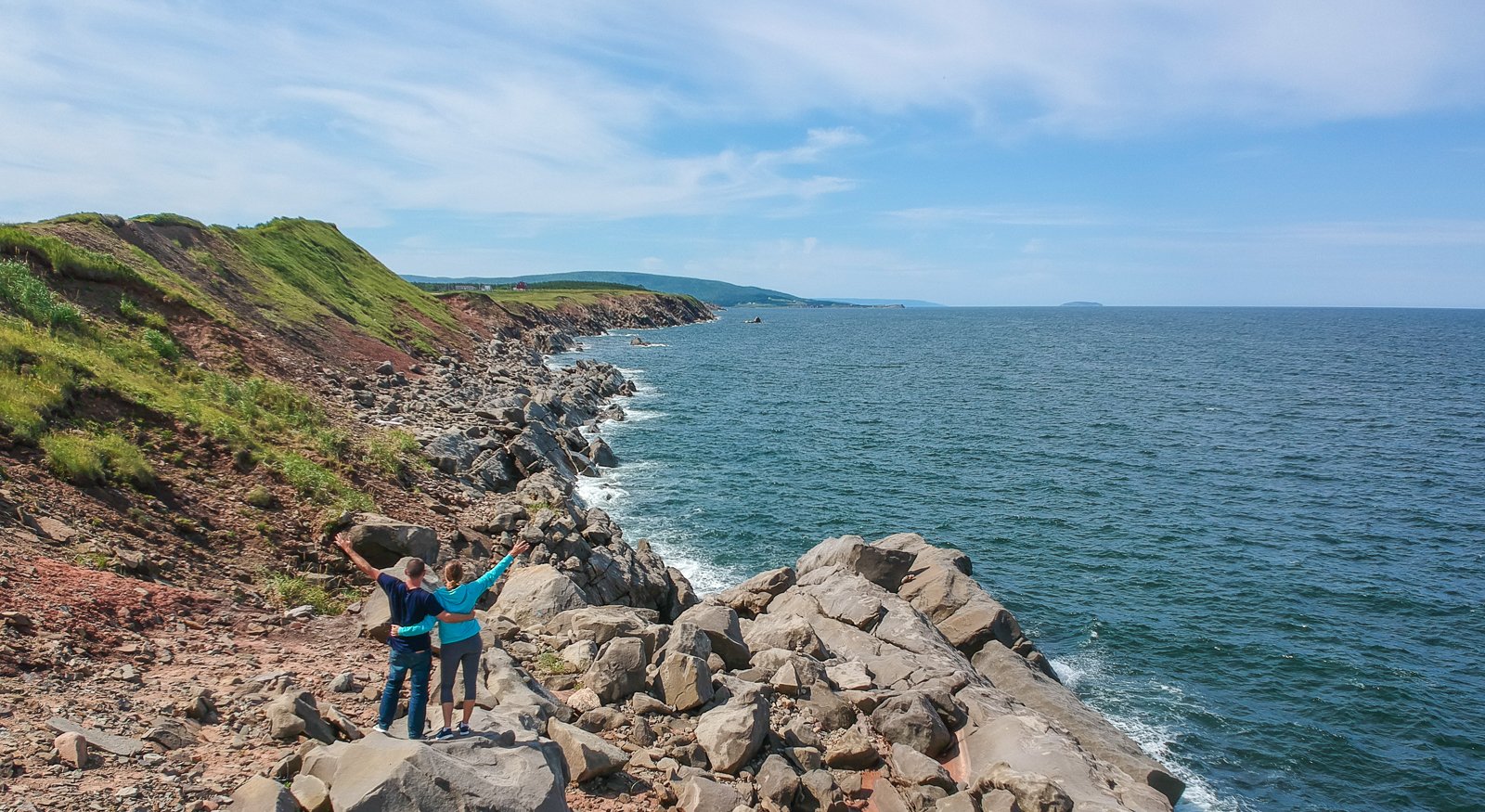15 Best Places to Visit in Nova Scotia, Canada, in 2023
With so many places to visit and things to do in Nova Scotia, if you’re on time constraints, choosing the must-sees can be a bit of a challenge.
Scenic drives, hiking opportunities, fresh seafood, and colourful fishing towns are just some of the many things you can expect to experience on your trip to Canada’s second-smallest province.
15 Best Places to Visit in Nova Scotia
We spent 15 days on a Nova Scotia road trip exploring Halifax, Cape Breton Island, the South Shore, Yarmouth and Acadian Shores, Bay of Fundy, The Annapolis Valley, and Northumberland Shore.
Yet, there are so many more places to see and things to do in Nova Scotia that we missed! Nova Scotia may be small, but it has a lot to offer travellers.
Wondering where to go in Nova Scotia? Check out our video: Best Places to Visit in Nova Scotia:
In this post, I’ll list the top attractions, things to do, points of interest, and the best places in Nova Scotia to help you plan your trip.
1. Halifax
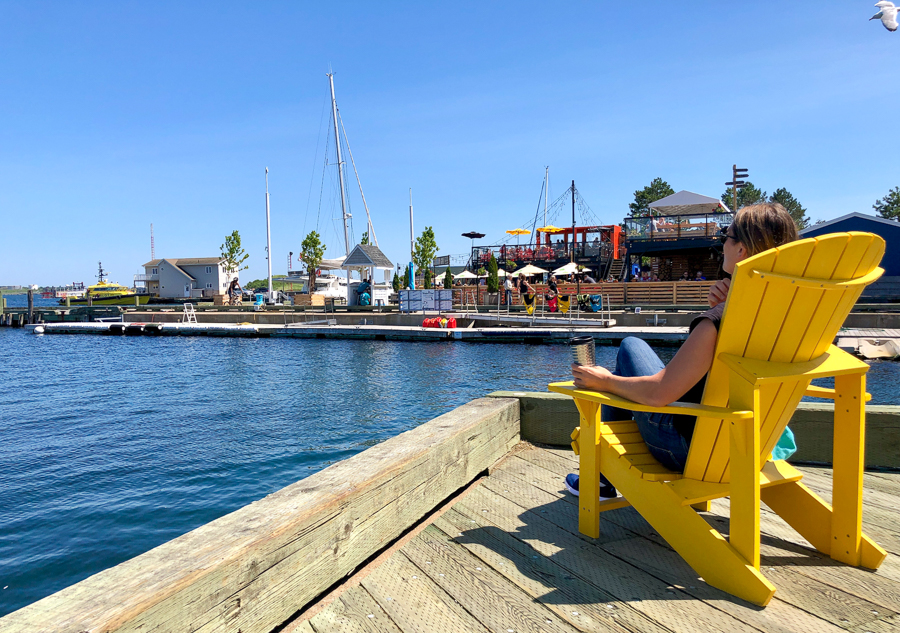
The capital city of Halifax is one of the best places to see in Nova Scotia — it’s also likely the first place you’ll see when you arrive. It’s a quick 30-minute drive from the Halifax Stanfield Airport to Downtown Halifax and the vibrant Waterfront area.
Halifax is small enough that you don’t feel overwhelmed, yet has enough on offer to keep you busy for a few days.
There are lots of neighbourhoods here as well, so if you have time, get out of the downtown area and explore a bit further. Dartmouth, for example, is just a 5-minute ferry ride ($2.50 CAD) across the bay.
The city is home to green spaces, historical sites, pedestrian-only walkways, events and festivals, galleries and museums, and of course, tasty restaurants! There are numerous things to do in Halifax to keep you busy.
Where to Stay in Halifax
Halifax has so many areas you could stay in, but if you want to be near the waterfront, great restaurants, and many of the tourist sites, then you’ll want to be around the Downtown area.
This is a busy part of the city, but it’s an excellent location for some spending a few days in Halifax.
We stayed at the historic Westin Nova Scotian (in their newly renovated rooms) and enjoyed the view of the harbour. The staff are very friendly, there are lots of onsite amenities, parking is available, and the breakfast omelette and waffle station was a nice bonus. Click here to see the latest room rates and reviews.
During our second stay in Halifax, we chose an Airbnb in a historic home near the Waterfront. If you’re interested in booking an Airbnb, don’t forget your coupon.
Where to Eat in Halifax
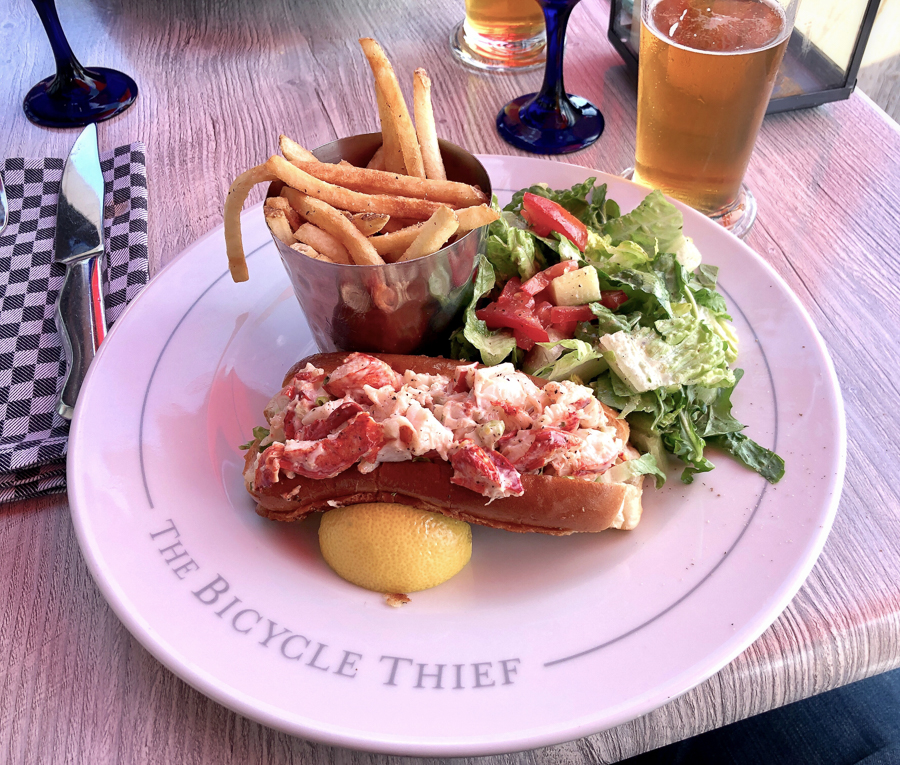
With a mix of seafood, international cuisine, and vegan-friendly options, Halifax is one of the best places to visit in Nova Scotia for foodies. Here are a few great options:
- Piatto Pizzeria – Italian style, wood-fired pizzas
- The Bicycle Thief – Excellent location, staff, and food. Try the lobster roll and rigatoni pasta with ragu sauce.
- The Five Fishermen – Although not located on the water, the dining area is lovely and the food is very good. Try the tenderloin steak and the lobster.
- The Wooden Monkey – We didn’t eat here, but it’s highly rated as a great place for vegetarians and vegans.
- Johnny K’s Authentic Donairs – This is the late-night hangout spot. When the bars let out, you’ll find party-goers snacking here!
- Smoke’s Poutinerie – Located on the waterfront, in the cluster of colourful food buildings, this is a good shop to sample poutine.
2. Peggy’s Cove (and nearby coves)
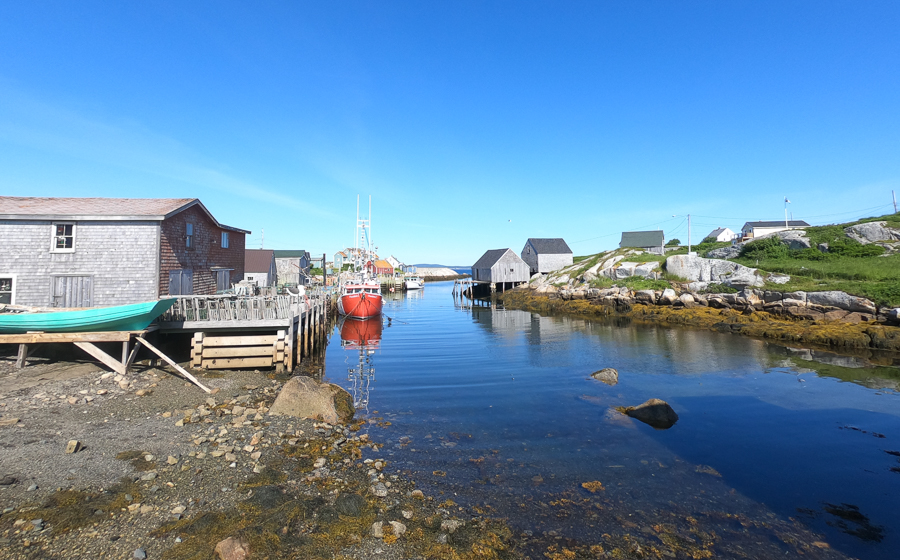
Peggy’s Cove is one of the most popular places to visit in Nova Scotia, so I had to put it on the list — it’s a must-see for good reason!
It’s about a 45-minute drive from Halifax along the Lighthouse Route to reach Peggy’s Cove, making it an easy day-trip from the Capital, or a great stop if you’re on a longer Nova Scotia road trip.
The community is set right on the ocean, with massive boulders offering viewing points of the Atlantic. The lone white and red lighthouse is one of the most photographed spots in the country.
Spend some time exploring the slow-paced community, including the inlets — look for jellyfish in the calm water.
There are so many nearby bays and coves that you could visit, either before or after Peggy’s Cove. Have a look at the Polly Cove hiking trail, Shad Bay and the other little spots along Prospect Road.
3. Mahone Bay
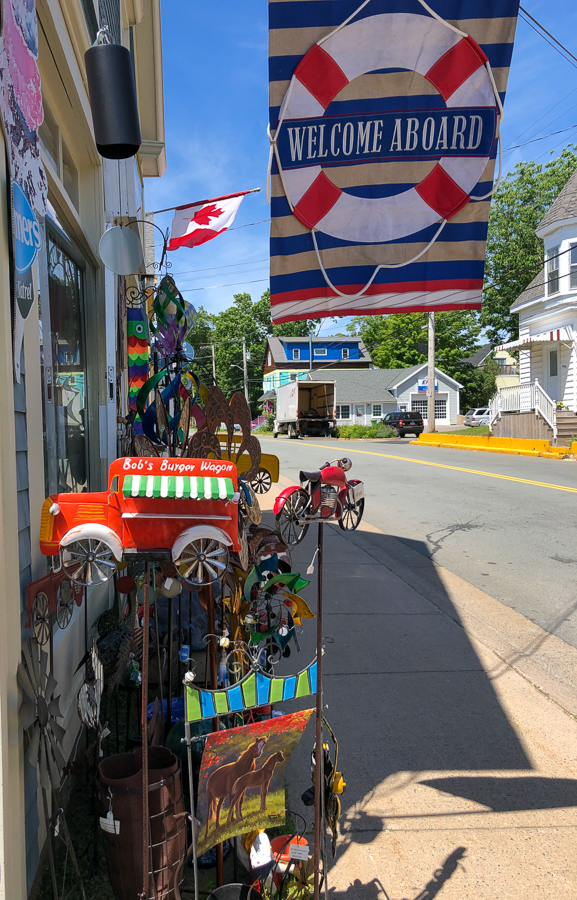
Continuing along the stunning Lighthouse Route, you’ll arrive at Mahone Bay (if you have a chance, check out Chester on the way), which is known for its iconic 3 churches, relaxed atmosphere, and small-town hospitality.
Visit one of the many shops making textiles, jewelry, and art, or check out the mobile library bus!
The locally-sourced food at the restaurants is divine (we had coffee at the Barn Coffee and Social House), and if you’re not driving, check out the Saltbox Brewery for some beers.
Mahone Bay is a great place to spend some time and is definitely one of the Nova Scotia attractions you don’t want to miss.
If you’re feeling more active, or have extra time, there’s actually a trail that connects Mahone Bay with the town of Lunenburg (below). This 10-kilometer pathway is called the Bay To Bay Trail, and you can join it at various points, or just hike a portion of it, rather than the whole trail. Click here for details.
4. Lunenburg
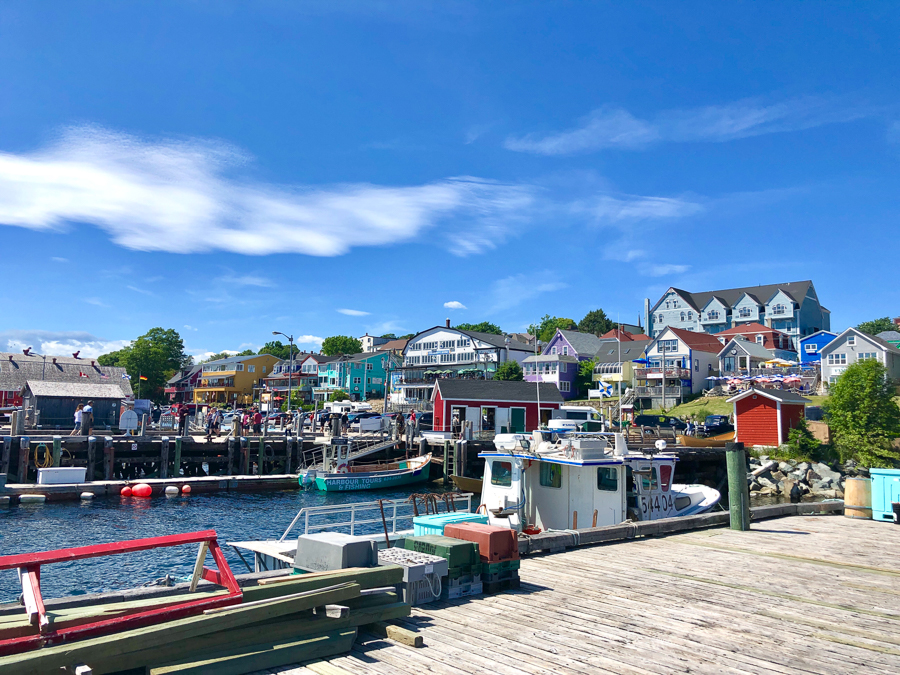
The whole town of Lunenburg is a top Nova Scotia attraction! This fishing village turned UNESCO listed town is a picturesque place you won’t want to miss.
Many people opt to do day trips here from Halifax, but I recommend spending the night to see the town when it’s not so busy.
With its British colonial grid-style streets, Victorian and Colonial architecture, and harbour-side restaurants, wandering around by foot in Lunenburg is an enjoyable experience.
I recommend joining the 1.5 hour long walking tour to get a lay of the land and to learn about the interesting history of the city (and the unique homes that line the streets).
Also, don’t miss the Ironworks Distillery tour ($15 including tastings and a gift). Even if you’re not a booze drinker, the building its set in is worth a visit itself.
Built in 1893, it used to be a blacksmith’s shop that made ironworks for the shipbuilding industry in Lunenburg.
Where to Stay in Lunenburg

There are lots of inns and hotels here in Lunenburg. One highly-rated option is the Sail Inn with harbour views from the rooms. The staff are friendly and the breakfast is delicious. Click here to see the latest prices and reviews.
Where to Eat in Lunenburg
The Savvy Sailor Cafe has tasty breakfasts and huge portions. The Grand Banker is highly rated for food and drinks, and so is the Salt Shaker.
5. Blue Rocks (one of the best places to visit in Nova Scotia for kayaking)
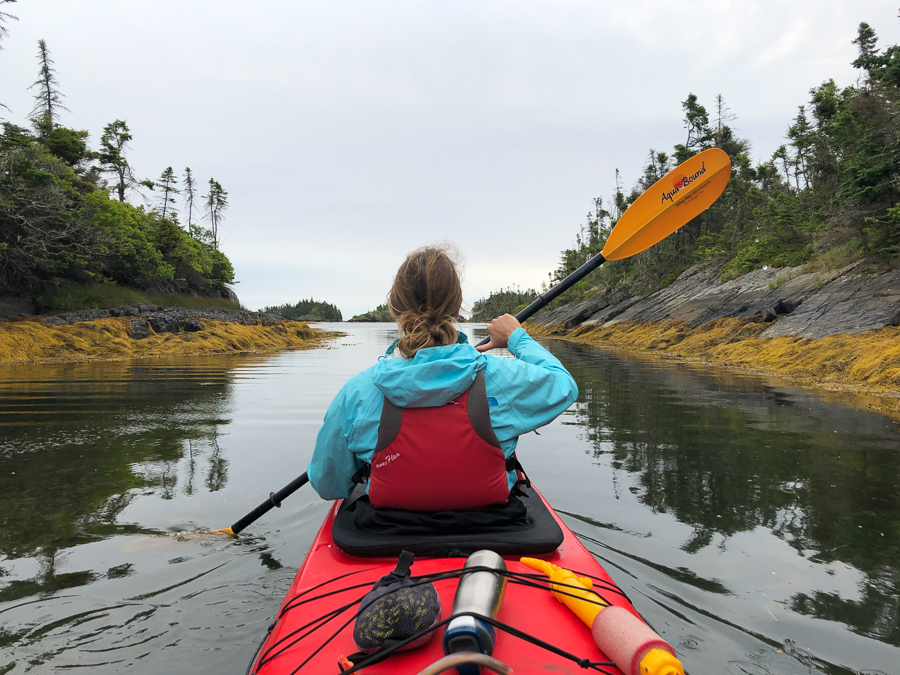
The community of Blue Rocks is located just a 10-minute drive from Lunenburg. This aptly named place is another photographer’s dream destination.
Small fishing shacks and boats are set next to blue shale rocks, with the thundering Atlantic Ocean on one side, and the calm inlets protected by small islands on the other.
Many people come here to wander around, take photos and simply enjoy the quiet of it all. However, this is also one of the best places to visit in Nova Scotia if you want to go kayaking!
Meet up with the guys at Pleasant Paddling for a day on the water. You’ll kayak through calm channels and narrow passageways between islands while learning about the flora, fauna, and history of the area. If you’re lucky, you’ll spot some seals.
If you don’t want to stay in Lunenburg and day-trip to Blue Rocks, you can stay in one of the guesthouses here. We spotted some yurts that we’d love to stay in next time.
6. Shelburne
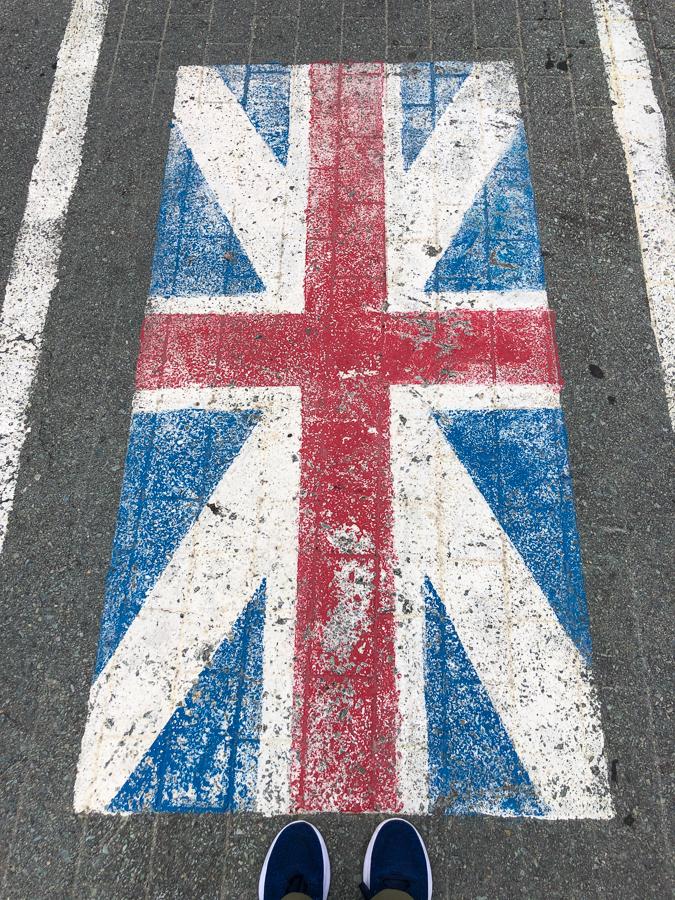
Shelburne, an oceanside town on the Lighthouse Route, is where thousands of Loyalists fled the United States during the American Revolution. Still loyal to the British, they were enticed to move to Shelburne with a promise of land and provisions.
These days, Shelburne still has British flags flying, and there’s even a UK flag painted on the street. Here you’ll also find a shipbuilding facility, farmer’s market, cafes and restaurants, and the Bowers Meadows Wilderness Area — which is a great place for fishing, canoeing, hiking, and camping.
We didn’t actually eat here as we just visited on a day trip, but I do recommend continuing to Barrington and Captain Kat’s Lobster Shack for a tasty lobster roll or fish n’ chips.
7. Kejimkujik National Park
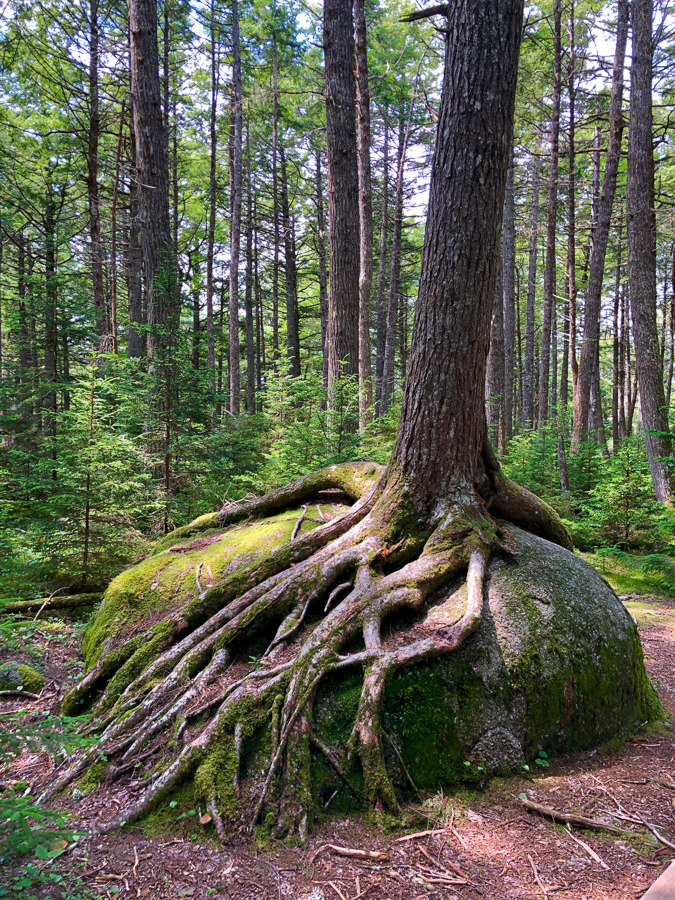
Before I tell you about Kejimkujik National Park, you’re probably wondering how to pronounce its name! It’s “keji-ma-ku-jik”…just say it fast and you’ll be fine.
This national park is a beautiful place to do some hiking in Nova Scotia, geocaching, canoeing, mountain biking and camping. Plus, you can stay in one of the cool forest cabins (something we want to do next time we visit Nova Scotia).
There are 15 hiking/biking trails, plus 2 backcountry trails that you can embark on. We chose to hike the “Hemlocks and Hardwoods” trail which was an enjoyable 5 km loop through the forest.
Some of the hemlocks here are around 400 years old! A portion of the hike is on a natural trail, while part of it is on a boardwalk to protect the tree roots.
The funny thing about this NP is that it’s actually split into two separate areas — inland Kejimkujik NP and the Kejimujik National Park Seaside, which is on the Atlantic.
The seaside park is just 25 minutes from the popular White Point Beach Resort, which has been a Nova Scotia vacation staple since 1928.
We stayed at White Point for two nights and drove to the Acadian Coast and Liverpool as day trips. We then crossed the province north and made our way to Kejimkujik National Park (1 hour from White Point). Sadly, we didn’t have a chance to visit the seaside national park.
With natural sites and towns less than an hour away, the White Point Beach Resort is a great place to base yourself. Plus, the resort itself has numerous activities and facilities on offer — walking paths, ocean swimming, pool, bonfires, SUP, kayaking, dining, live music…and more.
8. Digby Town and Digby Neck
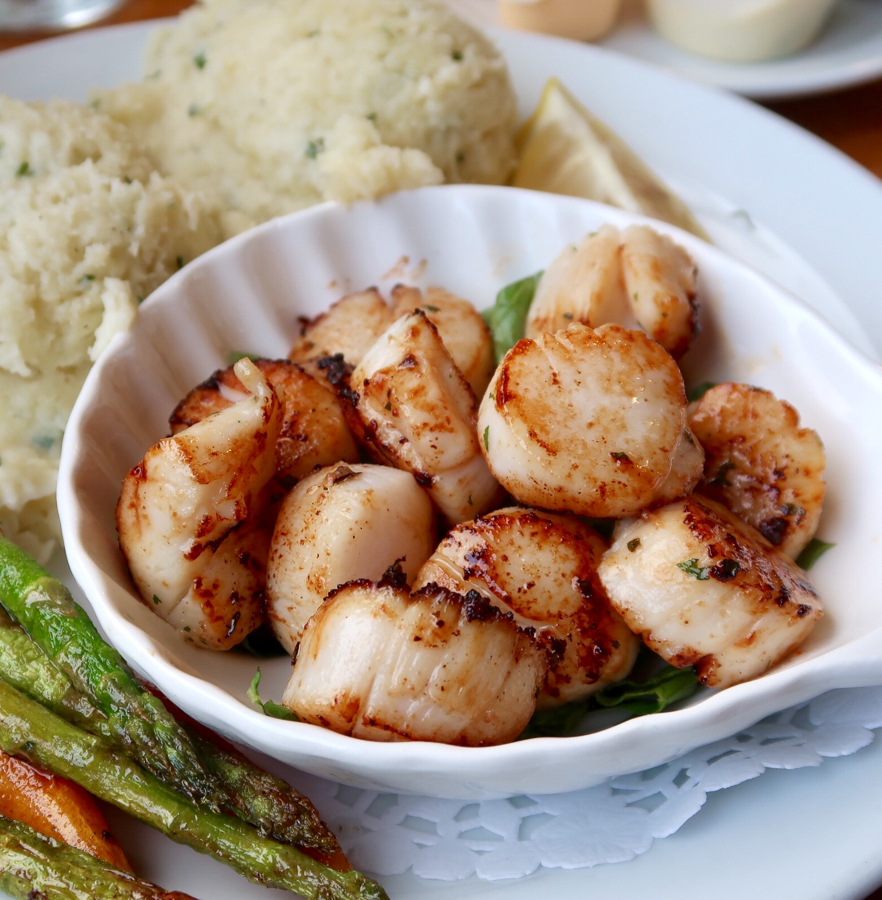
Known for being the scallop capital of the world, Digby is a place seafood lovers won’t want to miss. Pan-fried, deep-fried, sauteed, raw, bacon-wrapped, grilled, ceviche…the list of scallop preparations is endless!
After walking around the town of Digby (and looking for treasures at low tide), we sat down for a scallop-forward meal at the Shoreline Restaurant (now closed, unfortunately, but there are similarly good restaurants nearby). Not only was the food tasty, but the setting was stunning — we even saw seals popping their heads up in the water.
An evening stroll along the docks to see the fishing boats, and locals spin casting off the wharf before the sun goes down is a great way to end the day in Digby.
About 45 minutes from the town, is the Digby Neck. This peninsula is actually composed of the mainland, and two islands — Long Island and Brier Island. One side of the “neck” is the calm St. Mary’s Bay, and on the other is the large Bay of Fundy. This is the spot to do some whale watching.
We joined the morning tour with Petit Passage Whale Watching (there are 2 per day) and were lucky to spot a humpback whale and 2 finback whales, which are the second largest in the world!
The boat was large enough that it was comfortable, not cramped, and the staff members were knowledgable about the ocean and the marine life.
There’s something magical about seeing wildlife in its natural environment.
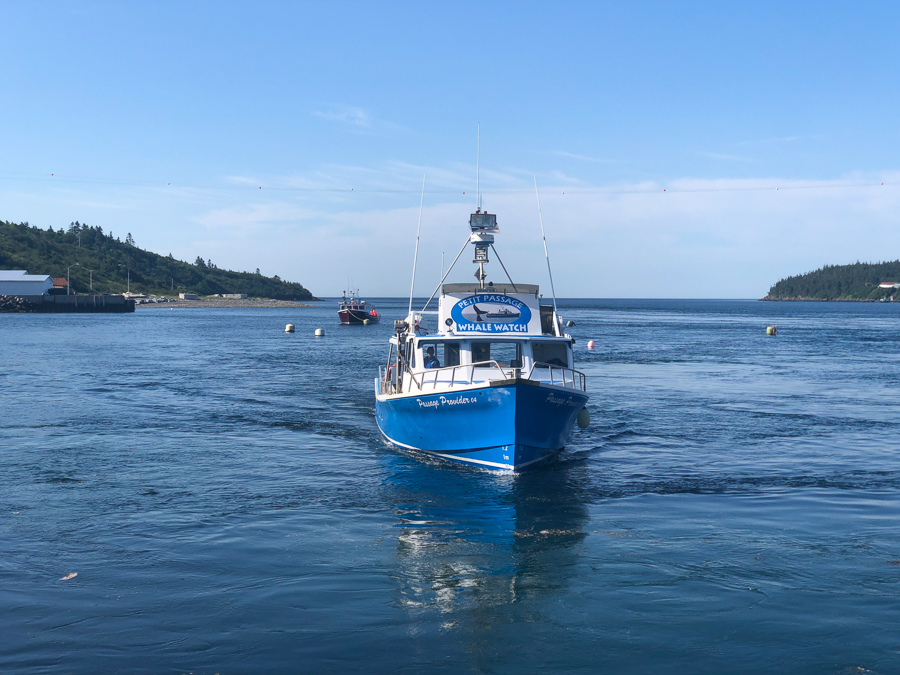
We stayed at Digby Pines Golf Resort and Spa, a lovely old building with sweeping views across the Bay of Fundy.
Here you can golf 18 holes, spend a day at the spa, swim in the outdoor heated pool, or simply relax on the patio with a beer in hand. The hotel offers a complimentary shuttle to and from the town center, which is a nice touch.
9. The Annapolis Valley (the best place to visit for wine lovers)

Annapolis Valley is located between two mountain ranges on the shore of the Bay of Fundy. Home to agriculture, farming, towns, and vineyards, this stunning valley is one of the most scenic places to see in Nova Scotia.
From farmers markets and U-pick Fruit & Veg, to wineries and orchards, this valley has lots to discover. Plus, the Annapolis Valley is home to numerous communities. I recommend visiting Wolfville and Annapolis Royal — the latter is where you’ll find Canada’s oldest National Historic Site (Fort Anne), and one of the oldest streets in all of North America.
Wolfville is an excellent place to base yourself when touring the vineyards around the valley.

In the town itself, you’ll find a great walking trail, boutique shops, a cidery (made with local apples), and lots of fun pubs and restaurants. Don’t miss Church Brewing — built in a converted church, this is a very unique place to grab a craft beer.
Surrounding Wolfville is where you’ll find the 11 established vineyards — which make some crisp white wines and some reds as well. Taking a winery bus tour with a designated driver is the best way to explore the vineyards.
We went with Grape Escapes, a tour that actually originated in Halifax but picked us up in Wolfville. We visited 3 vineyards – Benjamin Bridge, Luckett and Gaspereau – and enjoyed a fabulous lunch with our wine at Luckett Vineyards.
*Insider tip, try the Marquette red at Luckett, it was my favourite Nova Scotian wine.
Not only is the Annapolis Valley picturesque, but there’s also a UNESCO Heritage Site here (the Grand Pre National Historic Site), fruit and herb gardens, and one of the best winery restaurants in the world, Le Caveau.
For those who love fresh and locally grown produce, and supporting small businesses, you’ll definitely want to add the Annapolis Valley to your list of places to visit in Nova Scotia.
One stunning hotel with an excellent location in Wolfville is the Locust & Starr Inn. The property is surrounded by pretty gardens, and it includes breakfast.
10. Pictou
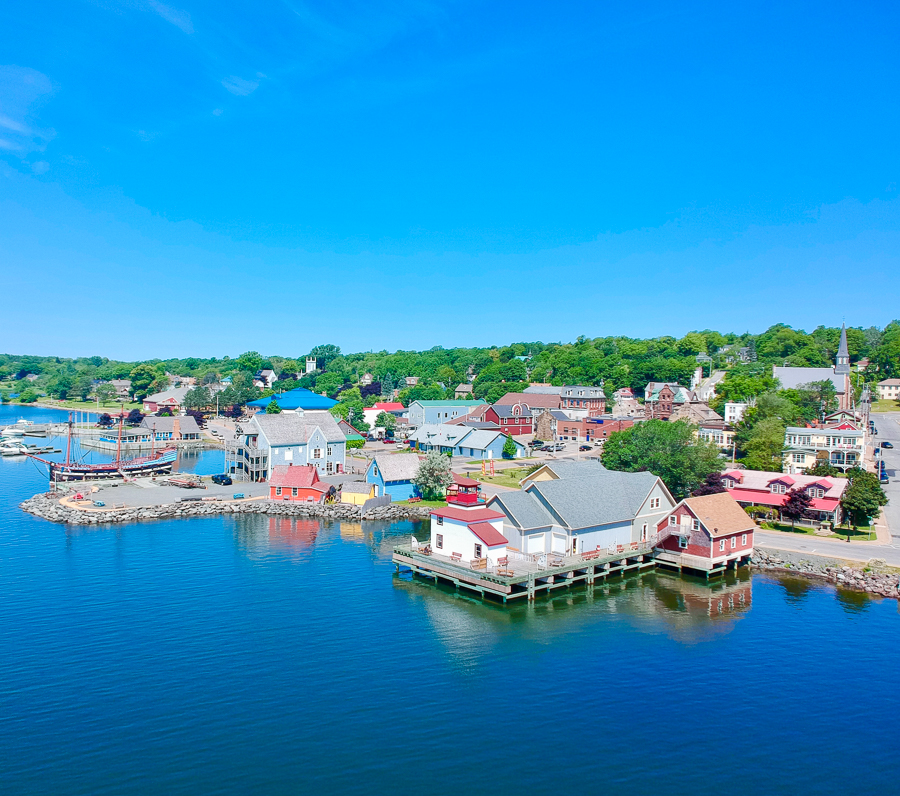
Nova Scotia translates to “New Scotland” in Latin, and Pictou was the first place the Scottish settlers landed when they arrived in Nova Scotia. These days, you’ll still see Scottish tartans on the light posts, and there’s a replica of the ship (Hector) that they arrive on in 1773.
Colourful homes and shops line the water, and the overall feel of the town is pretty relaxed. The Scotsman Inn is right on the Northumberland Strait, looking across to Pictou Island and Prince Edward Island beyond.
It’s a short walk into town and there are lots of activities nearby like kayaking, pedal boats, and SUP.
11. Inverness
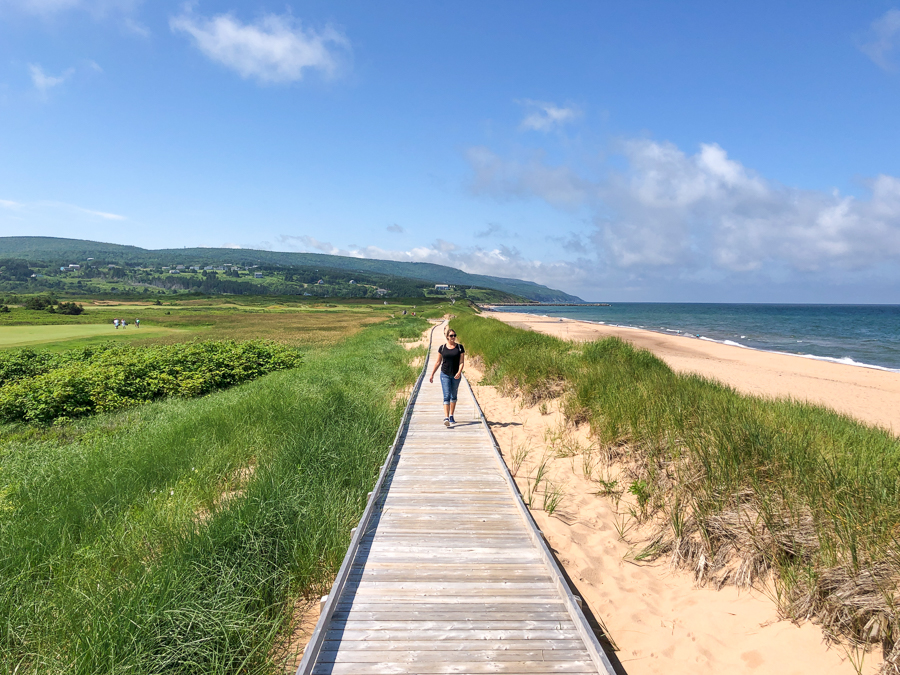
Inverness and the surrounding area is one of the best places to visit in Nova Scotia for golfers, fishermen, and those who want to do some camping.
Crossing the 2 kilometer Canso Causeway from the mainland of Nova Scotia, you’ll arrive on Cape Breton Island. Likely, if you’re taking the Ceilidh Trail clockwise, your first main stop on the island will be Inverness.
The town itself is home to the oceanfront boardwalk, the Cabot Links golf course, Route 19 Brewing, some churches, and a campsite with nice views over the water. Do as the locals do and scour the beach for sea glass — which they call “mermaid tears”.
A 10-minute drive from Inverness is the Glenora Inn and Distillery — the longest-running producer of single malt whiskey in North America.
In fact, there are only two on the continent! Take a tour of the distillery, sample the whiskey, eat a meal at the restaurant, listen to live music and spend the night in one of the rooms there. The grounds here are stunning and it’s a great place to stay.
12. Margaree Forks
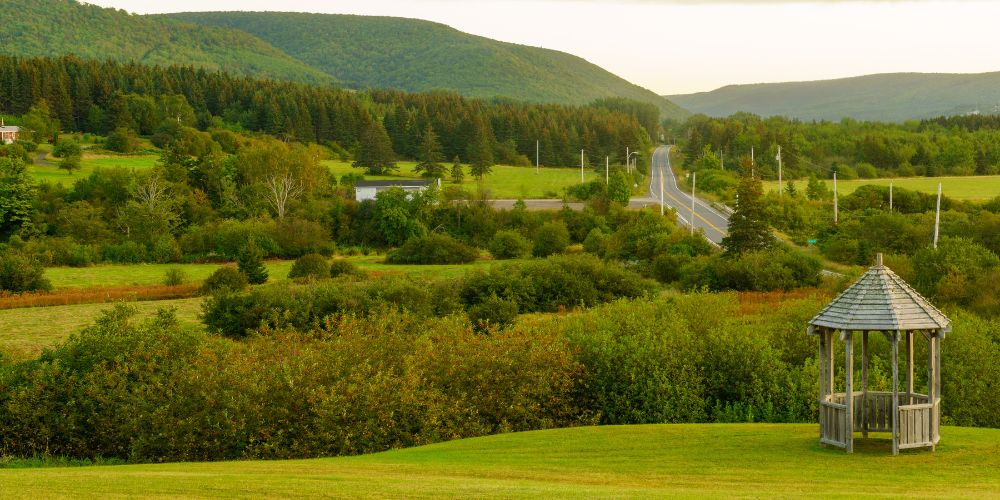
Just outside of Inverness is Margaree Forks, which is the best place in Nova Scotia to do some fly fishing, where 40-pound salmon run the Margaree River.
Get a fishing license for around $62 and some flies and head out to the river. Check out the Tying Scotsman for a license and flies, and A Great Day Fishing for reputable guides.
There are lots of places to stay right along the river, such as my favorite, Cajun Cedar Log Cottages. In you’d rather stay in Inverness, then Cape Breton Villas is an excellent choice.
13. The Cabot Trail

The Cabot Trail isn’t so much a “place” as it is a drive, but I had to add it to the list. At Margaree Forks, the 298 km (185 mile) Cabot Trail begins. You can choose to drive clockwise or counterclockwise (we did the former).
This route meanders along the coastline of Cape Breton Island, and high up into the plateaus of the aptly named Cape Breton Highlands National Park. Enjoy views of the wild, rocky coastline, the Gulf of St. Lawrence, and the beautiful forest.
Take your time (and lots of photos) during this drive. The Cabot Trail is one of the most amazing places to visit in Nova Scotia, and one of the best drives in North America.
14. Cape Breton Highlands National Park
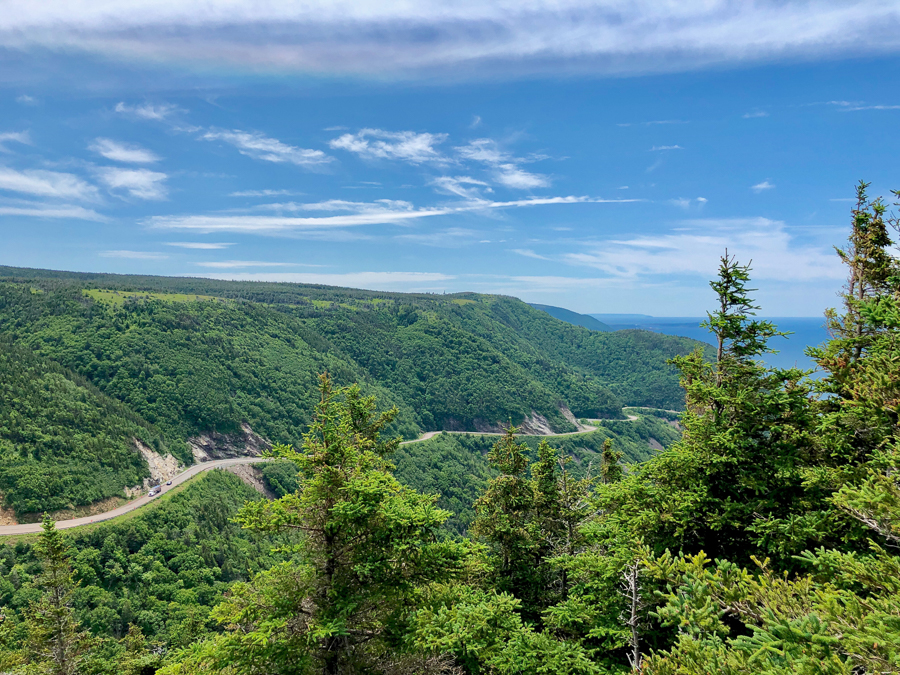
If you’re driving the Cabot Trail, you’ll cut through Cape Breton Highlands National Park. After paying $7.80 (for adults), you’re free to enjoy the natural beauty of this part of Cape Breton Island.
Lace-up your hiking boots and wander down one of the 26 trails in the park, find a hidden cove all to yourself and enjoy a snack, or do some camping, fishing, and kayaking! There are endless things to do here.
We hiked the Skyline Trail, which can be done as a return trip, or a loop. We opted for the 9.2 km (5.6 mile) loop walk through the forest.
At the end, the trail opens up and you’re greeted by the vast Gulf of St. Lawrence, the Cabot Trail winding through the mountainside, and Cheticamp Island.
We enjoyed this walk, but it was quite popular — for good reason. Your best bet would be to get there early and enjoy the quieter trail — you may even spot a moose.
There are lots of pull-offs and points of interest, but I recommend Lakie’s Head, which is a beautiful spot where you could potentially see whales.
Another quirky place is Groovy Goat, which is a family-run goat farm and soap company, and the Dancing Moose, which is a cafe that serves up tasty Dutch-style pancakes.
15. Ingonish (one of the best places in Nova Scotia for golfing, hiking and camping)
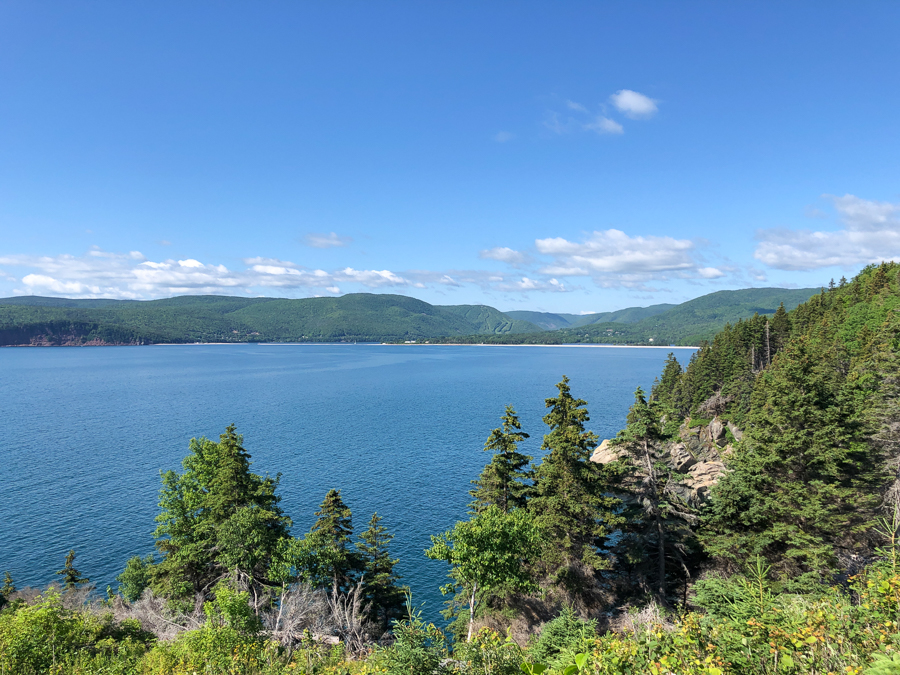
Of all the places to visit in Nova Scotia, Ingonish was one of our favourites for sure. Ingonish is actually an area of 6 different communities — Ingonish ferry, harbour, beach, centre, and North Ingonish.
This area offers hiking, camping, swimming, whale watching offshore, and more.
Depending on the tides, Ingonish Beach is either rocky or sandy and even though the water was chilly when we visited, Nick still went for a dip in the ocean!
There’s a freshwater lake at Ingonish Beach and you can camp here as well. If you’re not into camping, check out the Keltic Lodge at the Highlands, which has the most picturesque surroundings of any accommodation we’ve had.
With sweeping views of the ocean and the craggy cliffs, even if you’re not staying here, definitely come by for the view.
The Middle Head Trail starts here at the Keltic Lodge. It’s an easy, 1.5-hour loop that takes you out to the end of the point for a fantastic view. This hike is short but sweet.
Another more challenging option is the nearby Franey Mountain Trail, which takes around 3 hours and has a 300 m ascent, but offers incredible views from the top.
16. Bonus! Baddeck
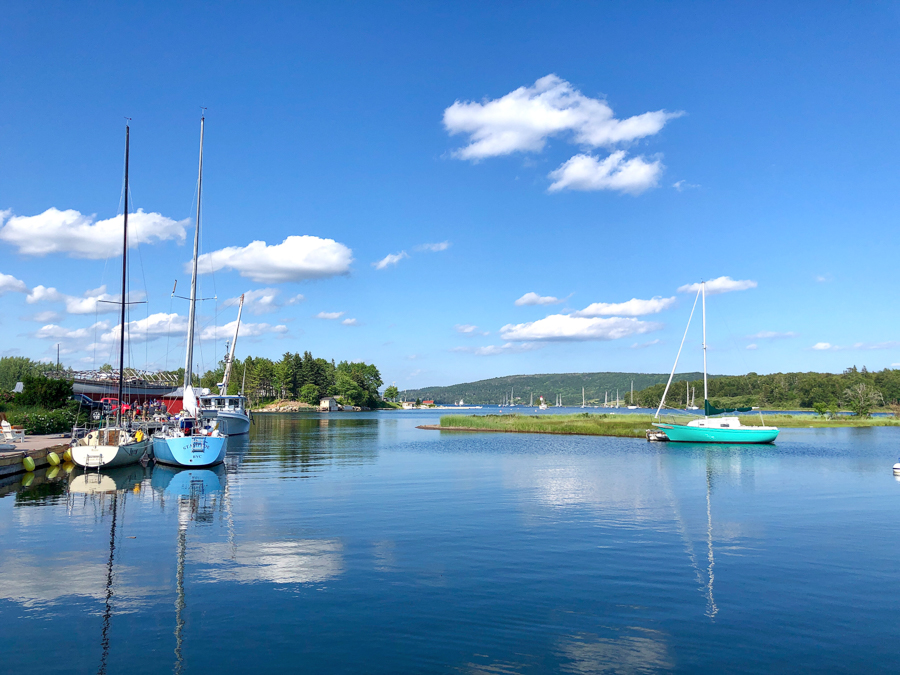
Last but not least on my list of best places to visit in Nova Scotia is Baddeck. Set on the gorgeous Bras d’Or Lake (Alexander Graham Bell had a family estate home here), this town is a great place to chill out for a while.
Enjoy water sports (kayaking SUP, jet skis, etc.), go on a boat tour to see puffins, visit the Alexander Graham Bell Museum, enjoy a leisurely coffee in town, or check out the nearby Usige Ban Waterfall.
The trail to reach the falls is around 3 kilometers long and should take about an hour to complete.
We stayed at the Inverary Resort, which had the perfect setting right on the lake. Enjoy late afternoon paddleboarding, kayaking, jet-skiing, or boat riding here — or just relax with a beer in hand!
10 Best Things to Do in Nova Scotia
You now know the best towns and places to visit in Nova Scotia, and here are the top 10 activities and things to do in the province that you won’t want to miss!
Here’s our video of the 10 best things to do in Nova Scotia:
1. Experience Tidal Bore Rafting
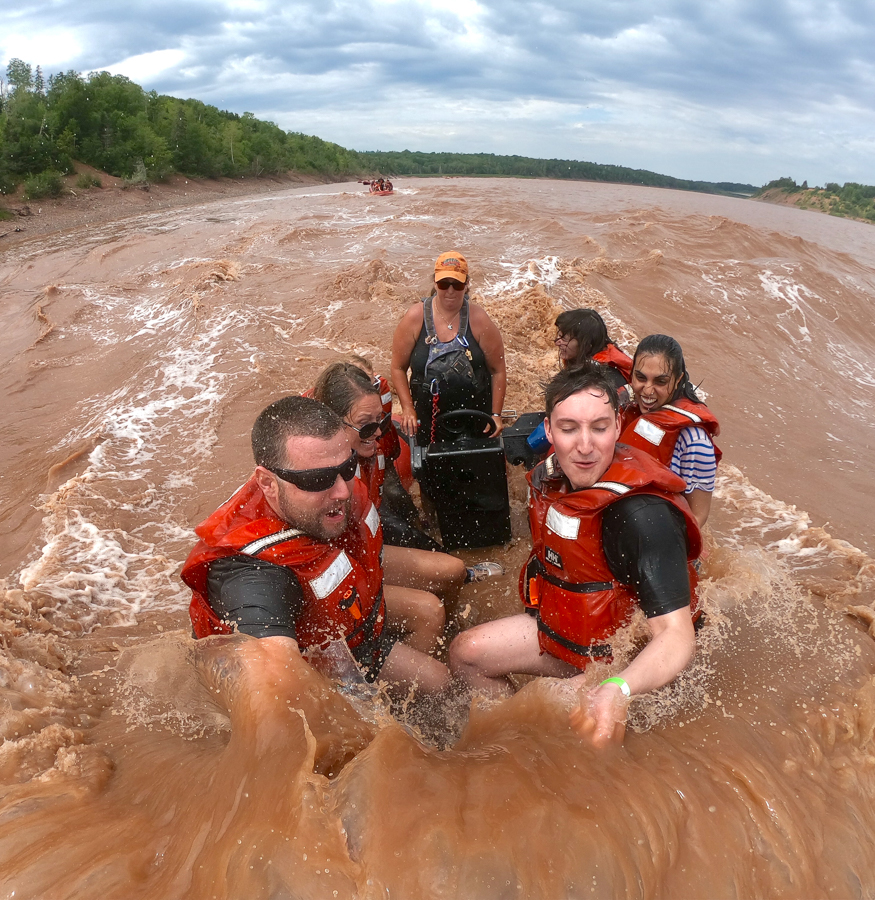
If you’re an adventurous person, tidal bore rafting should be firmly placed on your list of things to do in Nova Scotia.
Two times a day, the tides in the Bay of Fundy rise and fall (between 3.5 meters (11 ft) and 16 meters (53 ft)). When this massive influx of water meets the Shubenacadie River, the two collide to create rapids, waves, and a whole lot of swells.
Of course, rather than just watch this natural phenomenon, it’s far more exciting to hop on a zodiac and launch over the waves! Tidal bore rafting tops my list of Nova Scotia activities for sure. Hang on tight and enjoy the ride.
But, it’s not all about the crazy adventure on the river, you’ll also enjoy a quiet boat ride before the tide comes in, while spotting bald eagles high in the trees. After a few rounds of flying over rapids, release your inner child, and do some mud sliding on the banks of the river.
There are numerous companies to choose from, but we went with Tidal Bore Rafting Resort out of Urbania who have been in business since 1985.
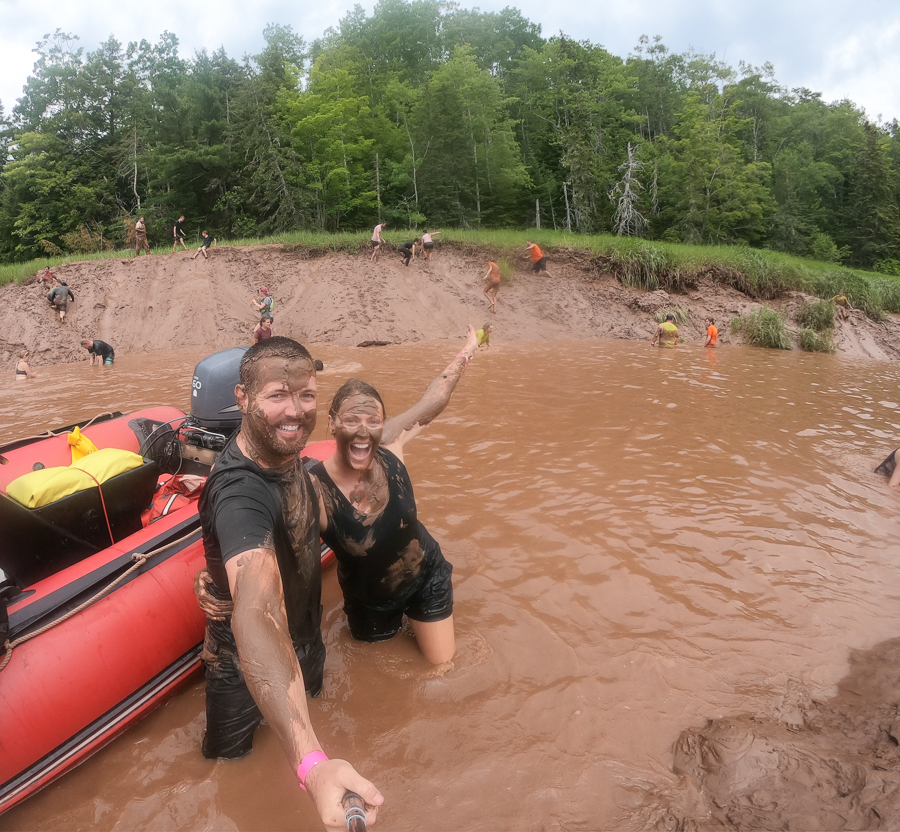
Tips: Make sure to wear clothing that you don’t mind throwing out afterward, or wear black (the titanium in the mud will stain your clothes). Leave your sunglasses and hat behind, and wear water shoes. Bring a change of clothing and towel — there are basic, hot showers available.
2. Drive the Cabot Trail (one of the most popular things to do in Nova Scotia)

The Cabot Trail is considered one of the most scenic drives in North America, and this 297 km (185 mile) route offers a stunning journey.
Located on Cape Breton Island which is an island connected to the mainland by a 2 km causeway, the Cabot Trail is one of the most beautiful places to visit in Nova Scotia.
It’s a great place to drive, cycle, or experience the curvy road by motorbike.
I recommend taking Route 19 (Ceilidh Trail) as you cross the causeway to Cape Breton Island. This is a picturesque route with nice places to stop along the way — Mabou, Glenora Distillery, Celtic Music Interpretive Center, Inverness, and Margaree Forks.
At Margaree Forks, the route splits and you start the Cabot Trail.
Depending on your travel plans, you can choose to drive clockwise, or counterclockwise. The whole trail could be done in a day, but a more enjoyable way to experience it is to drive for a little bit, hop out of your vehicle and go for a hike, a swim, and a meal before spending the night somewhere along the trail.
3. Go Hiking in National Parks
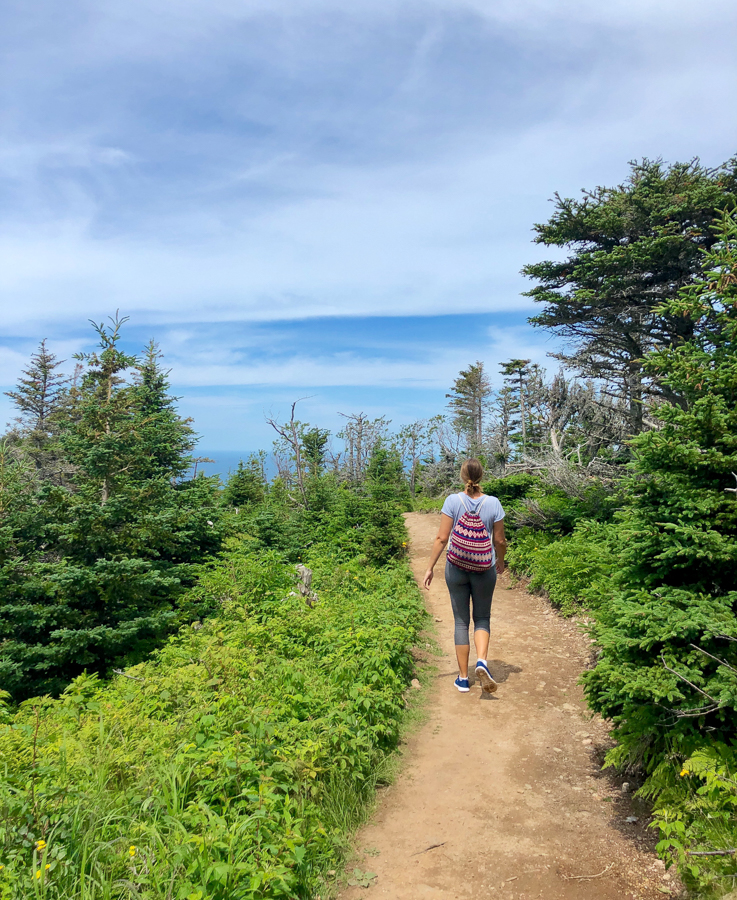
There are some great trails in the province and after driving, it’s always nice to get out and stretch your legs. Nova Scotia is home to two national parks, one national park reserve, and numerous provincial and historic parks.
When you’re travelling along the Cabot Trail, it cuts through the Cape Breton Highlands National Park ($7.80 CAD park fee), which is home to 26 hiking trails.
The most popular is the Skyline Trail, but if you enjoy hiking by yourself, this trail isn’t for you — at least not in the summer months when it’s quite busy.
However, it’s popular for good reason!
At the end of the loop, you’re rewarded with vast views out to the Gulf of St. Lawrence, and many people encounter moose on this trail (sadly, we didn’t).
Tip: While the hike to the end of the Skyline Trail was busy with other hikers, it seemed as though many people didn’t complete the 8.2 km (5.1 mile) loop, but instead, backtracked on the same path making the hike shorter (6.5 km / 4 miles). If you want to enjoy some quiet on this beautiful trail, I recommend doing the loop — we pretty much had the way back to ourselves.
Another great hiking opportunity is the Middle Head Trail which starts at the stunning Keltic Lodge at Ingonish. This 1.5-hour peninsula hike is more rugged than the Skyline Trail and offers incredible views on both sides of the peninsula. Look for woodpeckers, squirrels, and seabirds.
Nearby, you’ll find the Franey Mountain Trail, which is more challenging than Middle Head. It’s about 3 hours long, with a 300m ascent. Bring adequate food, water, and clothing for the hike.
Nova Scotia’s other national park is Kejimkujik, which is home to some great hikes as well. If you have the time and the ability to do so, you can embark on one of the backcountry trails (4 days long), or if you’re looking for a day hike, there are plenty of those as well ranging from 0.2 km to 5 km in length.
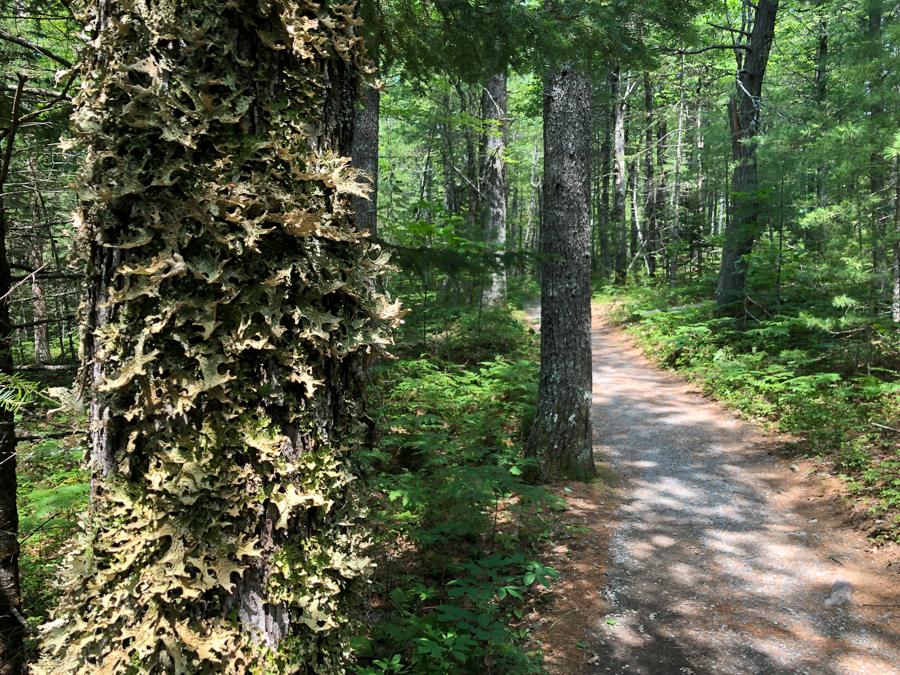
We chose the longest of the day hikes, Hemlocks and Hardwoods, and basically had the trail to ourselves.
Outside of the national parks, you’ll also find some great hiking. Check out the Celtic Shores Hiking Trail, the Bay to Bay Trail, and Polly Cove trail — to name a few.
Tip: Make sure to wear bug spray and thoroughly check yourself for ticks when you leave the park, as they carry Lyme disease.
4. Take in a Festival

If you’re looking for things to do in Nova Scotia year-round, take in one of the many festivals! Whether you’re into music, food, crafts, art, history, or sports, there will be a fun festival that interests you.
While you’ll definitely find events happening year-round, the vast majority happen during the summer months when the weather is warmer and you can enjoy the outdoor venues.
Don’t miss the TD Halifax Jazz Festival, Royal Nova Scotia International Tattoo, Pride Parade, Lobster Crawl, Ribfest, Wild Blueberry Festival, BuskerFest…and more!
5. Eat Seafood

The area is known for its abundance of seafood, so eating freshly caught shellfish is one of the things to do in Nova Scotia you don’t want to miss.
Each part of the province has a different lobster season, but you can find lobster practically any time of year.
Don’t miss a lobster boil, dining on 1.5 pounds of lobster at a nice restaurant (Five Fishermen in Halifax), sampling a lobster roll (Capt. Kat’s Lobster Shack, or The Bicycle Thief), or simply enjoying bits of lobster in a chowder or a pasta dish.
Once you’ve had your fill of lobster, head to Digby, which is known for its world-class scallops! Choose your preparation (grilled, pan-fried, deep-fried, bacon-wrapped, ceviche, raw, etc.) and dig in.
If lobster and scallops aren’t your thing, you can always find mussels, Atlantic salmon, halibut, haddock, and oysters readily available on most menus. If you’re wondering what to do in Nova Scotia on a rainy day, eating excellent seafood is my recommendation!
6. Follow One of the “Trails”
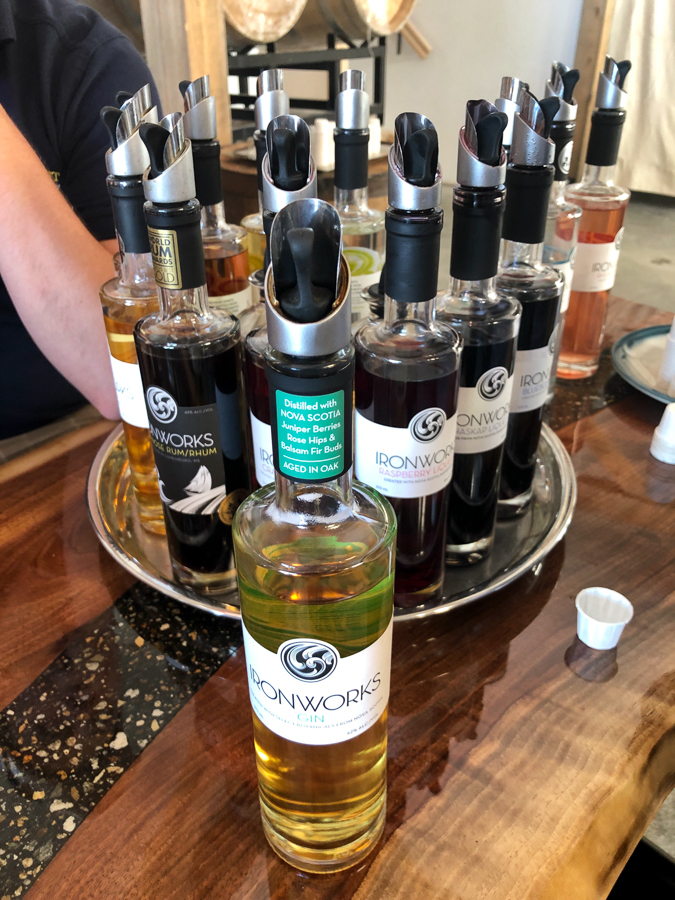
A really cool thing to do in Nova Scotia that I haven’t seen anywhere else is to follow one of the food and drink trails around the province.
Basically, you pick up a “passport” from a participating vendor, or you can register online for a digital passport. In this passport, you’ll find a list of tasty restaurants, bars and distilleries to sample the best food and drinks in Nova Scotia.
Once you’ve visited one of the stops, you get a stamp in your passport and once you have 3 stamps, you can enter to win prizes.
There are 3 trails:
With so many amazing restaurants and bars to enjoy, trying to figure out where to eat and drink is the hard part!
7. Go Camping
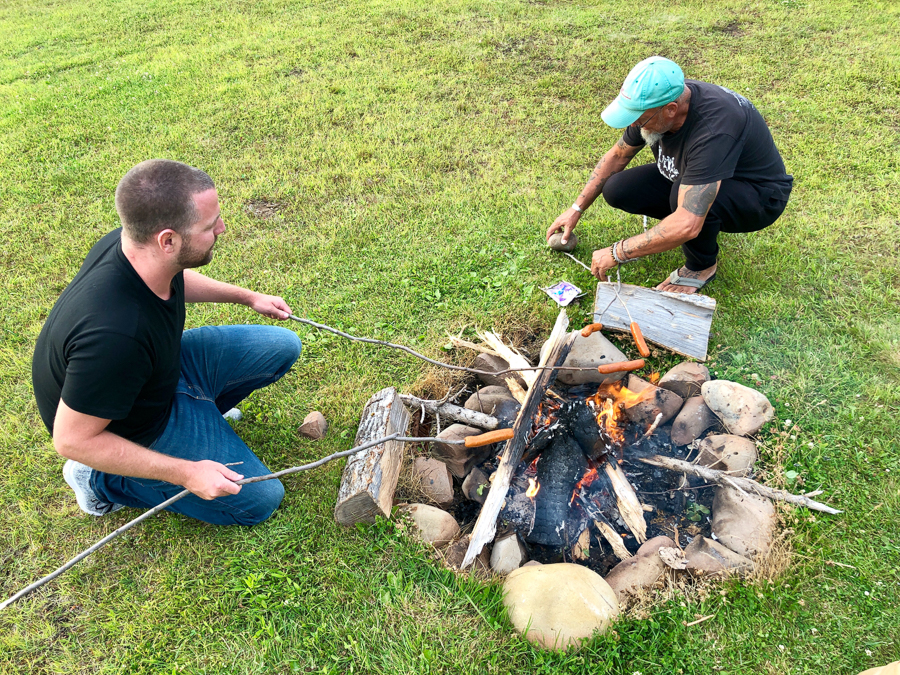
Since this post is about a Canadian province, it’s no surprise that camping makes it on this list of things to do in Nova Scotia. Blessed with nature, and almost completely surrounded by water, this is a great place to do some camping.
Either pitch a tent in one of the many campsites or spend the night in a unique oTENTik. If you’re pulling a trailer or driving an RV, there are lots of spots you can stop that have adequate amenities.
Cape Breton Island has numerous campsites available around Ingonish, Meat Cove, Broad Cove, Inverness, and more.
For other camping opportunities, check out Ovens Natural Park campground, Thomas Raddall Provincial Park, Kejimkujik National Park, Murphy’s Camping on the Ocean…to name a few. For a full list of campgrounds in Nova Scotia, click here.
8. Tour Vineyards
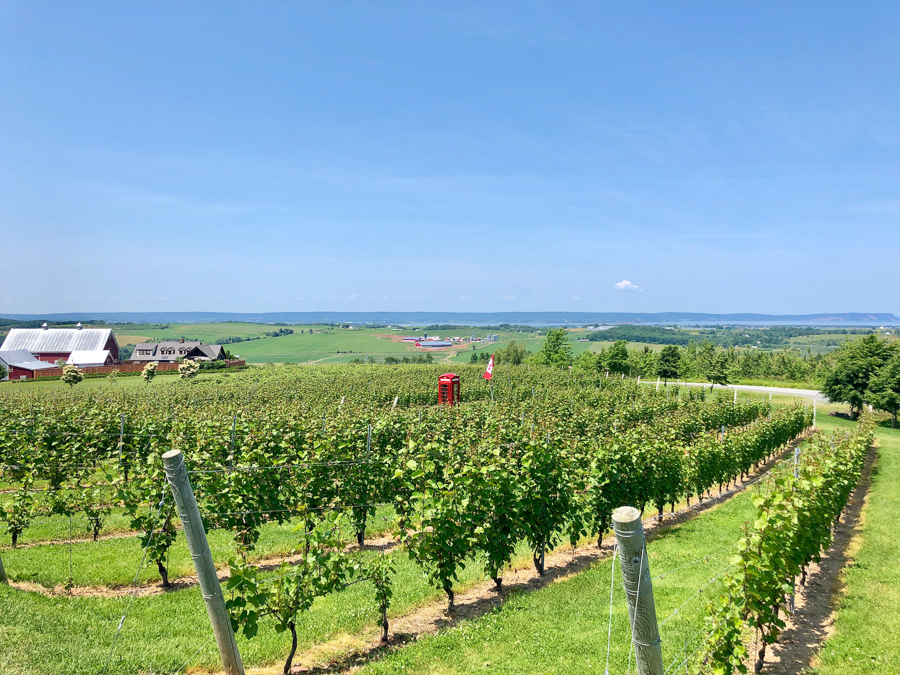
Although the provinces of British Columbia and Ontario produce the most amount of wine in the country, little Nova Scotia has some vineyards worth visiting and unique grape varietals worth sampling — especially if you like white and sparkling wines.
Nova Scotia is known for its Tidal Bay wine — the first wine appellation given in the province. Since the province is known for its seafood, ties with the ocean, and cool weather, the winemakers wanted to create a wine that reflects that — something cool and crisp.
In order to get the stamp of approval for a Tidal Bay wine, all grapes must be grown in Nova Scotia, be no more than 11% alcohol, and have a certain flavour profile (minerals, acidity, and green fruit).
While grapes are grown in many areas of the province, The Annapolis Valley is known for being wine country and with stunning views of the Bay of Fundy and 11 wineries to visit, it’s a place you’ll want to spend some time.
Base yourself in Wolfville or out in the valley, and hire a driver (or join a tour) for the trip so that you can fully enjoy the wine tastings!
While there are many vineyards to visit, I recommend Benjamin Bridge, Luckett and Gaspereau. All three have gorgeous surroundings and tasty wines.
Make sure to have lunch at Luckett Vineyards, the food is fabulous. Oh, and don’t forget to make a call from the red phone box 😉
9. Do Some Kayaking

Being surrounded almost completely by water, and home to numerous coves, bays, and islands, kayaking is one of the top activities in Nova Scotia.
There are lots of places you can go paddling, but I recommend Blue Rocks, which is a community just outside of Lunenburg.
Many people come here to photograph the pretty blue shale rocks, or to stroll around the quiet community, but the best way to see the natural beauty of the area is to hop in a kayak. We paddled through narrow passageways, and alongside rock islands, all while enjoying the calm water.
Even though the Atlantic Ocean can be incredibly rough and wild, the rock islands here provide protection for kayakers. To learn more about kayaking at Blue Rocks, click here.
10. Go Whale Watching

You’ll find excellent whale watching opportunities in the Bay of Fundy just outside of Digby on the Digby Neck (peninsula) and off of Cape Breton Island.
The whales start arriving in early spring and stay until fall, but typically, the humpbacks don’t show up until mid-June.
Having said that, we went whale watching in the Bay Of Fundy in mid-July and only spotted 1 humpback whale. The crew said that this year the whales were late arriving. So, it’s the luck of the draw!
Both whale watching spots in Nova Scotia offer the chance to see humpback, fin, and minke whales. The Bay Of Fundy also has Northern right whales, while Cape Breton offers the largest of them all, the blue whale, as well as pilot whales.
Our trip took us around the Digby Neck, past Brier and Long Island, and into the Bay Of Fundy. Even though we only spotted 1 humpback whale, we ended up seeing 2 fin whales (which are the second largest whale in the world!). There’s something magical about seeing wildlife in its natural habitat.
To learn more about whale watching in the Bay of Fundy, click here.
If it’s the wrong time of year for whales, you can always go on a seal watching tour. You learn about the history of the region and see lots of wildlife on this popular tour from Pictou.
Tip: Even if it’s a sunny day, make sure to bring some warm clothing. The weather can change in an instant, and it’s always chilly out on the water. Also, bring a hat, sunscreen, water and of course, your camera.
FAQs About Where to Go in Nova Scotia
Still have some questions about where to visit in Nova Scotia? Take a look at these frequently asked questions.
I think Lunenburg is one of the most beautiful cities to visit in Nova Scotia, and UNESCO agrees, having made the old town a world heritage site in 1995. Some of the most beautiful natural places to see in Nova Scotia are Kejimkujik National Park, Cape Breton Highlands National Park, and the rock islands of Blue Rocks.
As the capital and largest city, Halifax is the most visited place in the province. It’s also one of the most interesting cities in Nova Scotia to explore.
Scenic Peggy’s Cove is one of the best places to see in Nova Scotia, so don’t miss it. Also don’t miss out on great Nova Scotia activities like kayaking, hiking, and eating seafood.
The summer months, from June to August, are the best time to visit Nova Scotia. They have the warmest weather.
Unless you’re content to explore Halifax (one of the best cities in Nova Scotia) for a weekend, then I suggest at least a week. We spent 15 days there and I think we could have spent even longer!
Now You Know What to Do and Where to Visit in Nova Scotia
Depending on the length of your trip, you might not be able to see all of the places to visit in Nova Scotia that I listed. So, just choose the ones that stand out to you the most, or pick an area of the province and work your way around there.
The good news is that Nova Scotia is quite compact, making getting around and visiting numerous towns a breeze.
Of course, this list of activities and places to see when you visit Nova Scotia is just the tip of the iceberg. There are numerous other spots that we didn’t have a chance to get to!
I hope you enjoyed my list of 15 recommended best places to visit and the top 10 things to do in Nova Scotia. Enjoy your stay in Nova Scotia and check out our videos here:
Want to know what to do in Halifax? Check out our video: Top 10 Things to Do in Halifax
Want to know where to visit in Nova Scotia? Check out our video Maritime Travel: Our Highlights and Tips from Travelling Nova Scotia
A special thank you to the Nova Scotia tourism board for making this trip possible. As always, all thoughts and opinions remain our own.
Like This Article? Pin It!

